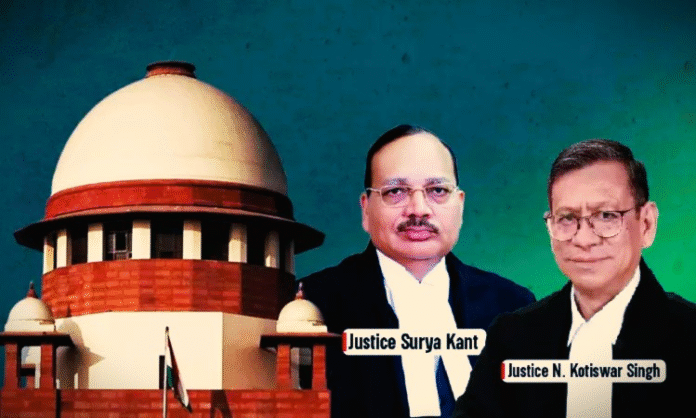“All members of the Paramilitary Force must note, there’s zero tolerance for such brazen misconduct,” observed the Supreme Court.
News Desk, New Delhi [India], 07 June: “All members of the Paramilitary Force must note, there’s zero tolerance for such brazen misconduct,” observed the Supreme Court.
In a strong message reinforcing discipline among paramilitary forces, the Supreme Court has upheld the dismissal from service of an Indo-Tibetan Border Police (ITBP) constable who allegedly looted the very cash box he was assigned to guard.
A bench of Justices Surya Kant and N. Kotiswar Singh ruled in favour of the Union of India, setting aside an earlier direction by the Uttarakhand High Court which had asked the ITBP to reconsider the dismissal of Constable Jageshwar Singh in light of alleged remorse and proportionality.
“The respondent was obligated to protect cash boxes containing lakhs of rupees. Instead, he became the looter. The misconduct is so grave that anything less than dismissal would be insufficient,” the Court said. It added, “All members of the Para Military Force must note there is zero tolerance for such acts.”
⚖️ Background and Case History:
Constable Jageshwar Singh was recruited into the ITBP in 1990. On the night of July 4–5, 2005, while posted as a sentry, he was entrusted with guarding cash boxes meant for disbursement to Coy personnel. However, he allegedly broke open the boxes, stole the money, and absconded.
A Court of Enquiry and a subsequent Summary Force Court found him guilty. He even made a confessional statement during proceedings. He was dismissed from service on November 14, 2005. After exhausting departmental remedies, he approached the High Court, arguing that the confession was involuntary and the punishment excessive.
While the Single Judge dismissed his plea for wrongful conviction, it questioned whether dismissal from service was proportionate. Citing the doctrine of proportionality, the court asked the ITBP to review if a lesser punishment could suffice, given his apparent repentance.
When the Division Bench of the High Court upheld the single bench ruling, the Union of India appealed to the Supreme Court.
📌 Supreme Court’s Findings on Proportionality:
The apex court acknowledged that proportionality is a vital part of constitutional jurisprudence, especially in administrative action. However, it emphasised that its application depends on the facts of each case.
In the case of a para military force like the ITBP, the court noted that values such as discipline, loyalty, and integrity are non-negotiable. The respondent’s past record of eight previous misconducts was also taken into account.
“The misconduct involved moral turpitude and breached institutional trust. The disciplinary authority rightly imposed dismissal from service after due process. This was not arbitrary or vengeful,” the bench said.
It concluded that the High Court had overstepped in invoking discretionary powers to compel reconsideration of punishment. Hence, the Court allowed the appeal and restored the dismissal order.
📂 Case Title:
Union of India v. No. 900224364 Const/G.D. Jageshwar Singh, C.A. No. 7029/2025
🔗 Useful Links:
- Read more on recent Supreme Court rulings
- Explore insights on police misconduct and reforms
- Stay informed with our legal helpline articles
- Visit The Legal Observer for the latest legal updates
🔗 Video Updates:
Watch related legal discussions on our YouTube Channel
supreme court, itbp, para military force, sentry, cash box, looter, dismissal from service, proportionality, itbp constable, zero tolerance, cash box robbery, misconduct, disciplinary action, court of enquiry, doctrine of proportionality, indo-tibetan border police (itbp) constable, para military forces, cash boxes containing lakhs of rupees, constable jageshwar singh




